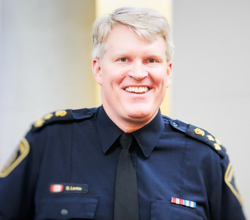Visiting Police Chief delivers lecture to students

Chief of Waterloo Regional Police Service, Bryan Larkin
Students from across the University of Guelph-Humber turned out on Thursday, November 17th for a lecture delivered by the chief of Waterloo Regional Police Service, Bryan Larkin. Chief Larkin, a graduate of UofGH’s first Justice Studies cohort, has a policing resume that includes extensive experience in community and media relations. The lecture was part of a senior Media Studies class called “Media Relations”, and he spoke to how media shapes public policy and how his background with the media informs his police work.
“I couldn’t be successful as chief if I hadn’t been involved in media relations — the opportunity to work with journalists really shaped my mindset with respect to transparency, accountability and being open to the public,” he says. “For these students in media and justice studies, I want to impress to them that the power of communication, of strong public speaking, and the ability to articulate your thoughts clearly and concisely are essential skills that can lead to great things.”
Chief Larkin says that a transparency mindset will be increasingly important to police work as technology creates ever-greater opportunities for civilian oversight. More than just police body cameras, Chief Larkin envisions that the police work of tomorrow will be defined by accountability.
“I think the future is a very open and transparent place,” he says, “and I think information legislation will change, giving people far greater access to police video and interviews. Already, the popularity of smartphones has revolutionized the way we do business and has changed the story of how we serve our communities.”
Of course, those changes also come with opportunities for those who will embrace them. Social media and the platforms they provide are a chance for people in positions of leadership to speak more directly with the communities they represent, especially young people.
“I want to have the most youth-friendly police service in Canada, and social media is a huge part of that,” says Chief Larkin. “Posting on Twitter humanizes the position and makes people feel like they know you a little bit and can see what you do each day. It also lets me draw attention to all the good work that our community partners are doing.”
Nonetheless, amid the sea of technology in our lives, he says that in police-community relations, as elsewhere, it’s essential to bring a human touch to what you do.
“Every once in a while, you should write a personal note rather than an email, or meet someone face-to-face instead of over the phone. That kind of effort goes a long way.”


